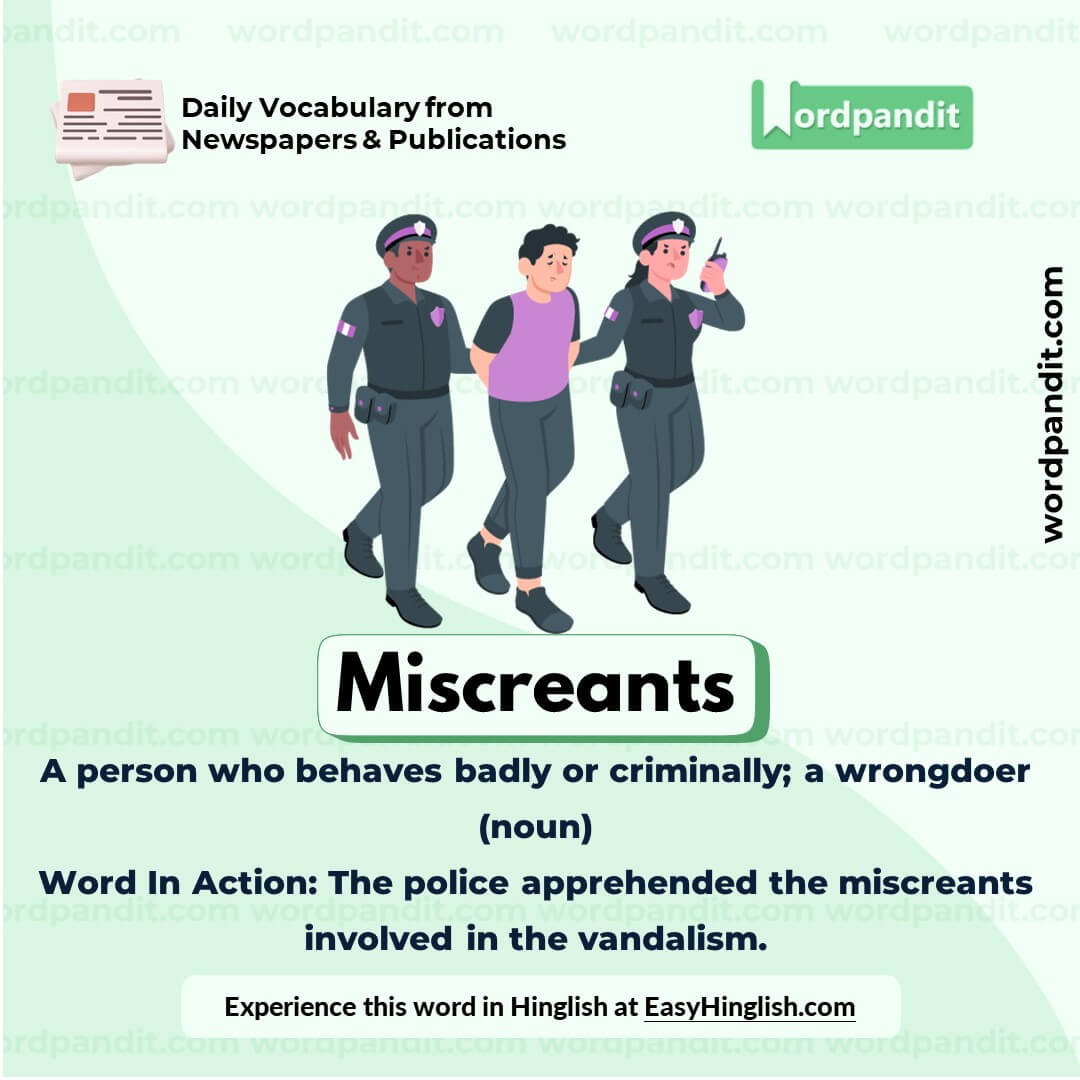Daily Vocabulary from Indian Newspapers and Publications
Welcome to Wordpandit’s Indian Vocabulary Hub
At Wordpandit, we understand the importance of staying rooted in the local context while expanding your language skills. This section focuses on enriching your vocabulary with words and phrases drawn from India’s leading newspapers and publications, ensuring you're learning vocabulary that is practical, relevant, and uniquely Indian.
Why Indian Sources Matter
We believe that the best way to master any language is by immersing yourself in local content. That’s why we carefully curate vocabulary from top Indian publications, including:
- The Hindu
- The Times of India
- The Economic Times
- Hindustan Times
- Live Mint
- The Indian Express
- And many others...
Stay Updated, Stay Relevant
With daily updates from Indian news sources, you’ll be consistently learning words that reflect the trends and shifts in Indian society and culture. Our focus is to provide vocabulary that enhances your understanding of the language in an Indian context.
How Wordpandit Supports Your Goals
Whether you’re preparing for exams, aiming to improve your professional communication, or simply want to stay connected with the latest Indian vocabulary, Wordpandit is here to guide you every step of the way.
Learn with a Practical Approach
Our interactive learning methodology includes real-world examples, engaging activities, and context-specific usage to ensure that every word becomes part of your active vocabulary.
Dive into Indian Vocabulary Today!
Why Choose Wordpandit?
Practical Learning: Focus on words you'll actually encounter in real-world reading, enhancing your comprehension and communication skills.
Diverse Content: From current affairs to scientific breakthroughs, our varied sources expose you to vocabulary across multiple domains.
Effortless Integration: Make Wordpandit a part of your daily routine. Just a few minutes each day can significantly boost your lexicon over time.
Your Path to Vocabulary Mastery
- Visit our Daily Vocabulary section regularly
- Explore new words and their usage in context
- Practice incorporating these words into your own writing and speech
- Track your progress as your vocabulary expands
Start Your Journey Today
Embark on your vocabulary enhancement journey with Wordpandit. By consistently engaging with our daily posts, you'll build a robust vocabulary that serves you well in academic, professional, and personal contexts.
Remember, a word a day keeps linguistic limitations at bay. Make Wordpandit your daily companion in the quest for vocabulary excellence!
WORD-1: Mandate
Context:
"Trump’s victory in the popular vote by five million votes also gives him a powerful mandate to implement his trade policy agenda." - The Wire
Explanatory Paragraph:
The word "mandate" refers to an official or authoritative instruction or command, often given by voters to their elected officials. It implies a strong endorsement of policies or actions by a governing body or leader, especially when backed by a clear or decisive majority.
Meaning: An authoritative order or approval to act (noun); to give someone authority to act (verb).
Pronunciation: man-date
Difficulty Level: ⭐⭐⭐ Intermediate
Etymology: From Latin "mandatum," meaning "command" or "order," derived from "mandare," meaning "to command."
Synonyms & Antonyms:
Synonyms: directive, order, command, decree
Antonyms: suggestion, recommendation, proposal
Usage Examples:
- The newly elected president claimed a strong mandate to reform healthcare.
- The company’s shareholders gave the CEO a clear mandate to expand internationally.
- The court issued a mandate requiring the immediate release of the detainees.
- The voters' mandate was clear: they wanted change.
Cultural Reference:
"The Mandate of Heaven" in Chinese history referred to the divine right to rule, which could be lost if the ruler failed to govern justly. - Historical Studies
Think About It:
How does a mandate differ in its meaning and implications when used in a political versus a corporate context?
Quick Activity:
Think of a recent policy implemented in your country. Write a sentence explaining whether it was supported by a mandate or not.
Memory Tip:
Imagine a "man" holding a "date" in one hand, symbolizing an official order to act on a specific task.
Real-World Application:
In democratic systems, a strong mandate often empowers leaders to push forward their agendas, reflecting the electorate's trust in their vision.
WORD-2: Exempted
Context:
"Mexico and Canada may potentially be exempted from the increase in tariffs; however, their exports could encounter elevated non-tariff barriers and stricter border controls." - The Wire
Explanatory Paragraph:
The word "exempted" means to be freed or excused from a rule, duty, or obligation that applies to others. It often refers to situations where certain individuals, groups, or entities are not required to comply with a specific regulation, law, or policy.
Meaning: Freed from an obligation, duty, or liability imposed on others (verb).
Pronunciation: ig-zempt-ed
Difficulty Level: ⭐⭐ Beginner
Etymology: From Latin "exemptus," meaning "taken out, freed," derived from "eximere," which combines "ex" (out) and "emere" (take).
Synonyms & Antonyms:
Synonyms: excused, freed, absolved, spared
Antonyms: obligated, bound, required, accountable
Usage Examples:
- Students with medical conditions were exempted from the physical education requirements.
- The company was exempted from taxes for its first year as part of an economic incentive program.
- Vehicles carrying essential supplies were exempted from the curfew restrictions.
- His seniority exempted him from mandatory overtime work.
Cultural Reference:
In some countries, religious institutions are exempted from paying property taxes, which reflects their special status in society. - Public Policy Journal
Think About It:
Should certain groups or entities always be exempted from laws or taxes? Why or why not?
Quick Activity:
Write a sentence about a situation where you or someone you know was exempted from a rule or duty. Explain why the exemption was granted.
Memory Tip:
Remember "exempted" as being "EXcluded from something EMPtying your time or wallet."
Real-World Application:
"Exempted" is often used in tax policies, legal frameworks, and government regulations to designate entities or individuals who are not subject to specific obligations, simplifying processes or offering relief.
WORD-3: Magnitude
Context:
"Trump administration has hitherto not disclosed details regarding the timing, magnitude and enforcement of tariffs and other trade protectionist measures." - The Wire
Explanatory Paragraph:
The word "magnitude" refers to the size, extent, or importance of something. It is often used to quantify or describe the scale of a phenomenon, event, or action, highlighting its significance or impact.
Meaning: The great size, scale, or importance of something (noun).
Pronunciation: mag-ni-tood
Difficulty Level: ⭐⭐⭐ Intermediate
Etymology: From Latin "magnitudo," meaning "greatness," derived from "magnus," meaning "great."
Synonyms & Antonyms:
Synonyms: scale, extent, size, significance
Antonyms: insignificance, triviality, smallness
Usage Examples:
- The magnitude of the earthquake was measured at 7.5 on the Richter scale.
- The financial crisis revealed the magnitude of mismanagement within the banking sector.
- Scientists were amazed by the magnitude of the new galaxy discovered in the outer universe.
- The protesters gathered in large numbers to emphasize the magnitude of their concerns.
Cultural Reference:
In astronomy, "magnitude" is a key term used to describe the brightness of stars, with lower numbers indicating brighter stars. - NASA Educational Resources
Think About It:
Why is understanding the magnitude of an issue critical for effective decision-making?
Quick Activity:
Think of a recent event in your life and describe its magnitude. Was it small, moderate, or large? Why?
Memory Tip:
Link "magnitude" to "mighty in attitude," symbolizing greatness in size or importance.
Real-World Application:
The term "magnitude" is widely used to quantify the impact of natural disasters, financial shifts, and social movements, helping to prioritize responses and resources.
WORD-4: Intrude
Context:
"But the same microchip, an epitome of technological progress, is intruding into our neurons like a mischievous Trojan horse." - The New Indian Express
Explanatory Paragraph:
"Intrude" refers to the act of entering or interfering in a place, situation, or activity where one is not welcome or has no right to be. It often carries a negative connotation, suggesting an unwelcome disruption or invasion of privacy.
Meaning: To enter or interfere without invitation, permission, or necessity (verb).
Pronunciation: in-trood
Difficulty Level: ⭐⭐ Beginner
Etymology: From Latin "intrudere," meaning "to thrust in," derived from "in-" (into) and "trudere" (to thrust).
Synonyms & Antonyms:
Synonyms: encroach, invade, trespass, infringe
Antonyms: withdraw, retreat, respect, comply
Usage Examples:
- The neighbors complained about the company intruding on their property boundaries.
- She felt her thoughts were being intruded upon by constant notifications on her phone.
- An unfamiliar voice intruded on their private conversation, startling them.
- The new regulations intrude on individual freedoms, sparking debates across the country.
Cultural Reference:
The story of the Trojan horse from Greek mythology symbolizes how something seemingly harmless can intrude and cause harm, just as described in the context. - Mythological Tales
Think About It:
What steps can individuals and organizations take to prevent unwelcome intrusions into their personal or digital lives?
Quick Activity:
Write a sentence describing a scenario where an act of intrusion disrupted a peaceful situation.
Memory Tip:
Imagine "intrude" as someone "in"truding into your private space uninvited.
Real-World Application:
"Intrude" is commonly used in discussions about privacy concerns, whether related to physical spaces, personal boundaries, or digital security, emphasizing the importance of respecting limits.
WORD-5: Miscreants
Context:
"Miscreants set fire to the Shri Shri Radha Krishna Temple and the Shri Shri Mahabhagya Lakshmi Narayan Temple." - The Hindustan Times
Explanatory Paragraph:
"Miscreants" refers to people who engage in illegal, immoral, or harmful activities. The term often describes individuals causing deliberate trouble or harm to others, whether through violence, vandalism, or other disruptive acts.
Meaning: A person who behaves badly or criminally; a wrongdoer (noun).
Pronunciation: mis-kree-uhnts
Difficulty Level: ⭐⭐ Beginner
Etymology: From Old French "mescreant," meaning "heretic" or "unbeliever," derived from "mes-" (wrongly) and "creant" (believing).
Synonyms & Antonyms:
Synonyms: wrongdoer, offender, delinquent, villain
Antonyms: upstanding citizen, law-abiding person, benefactor
Usage Examples:
- The police arrested several miscreants involved in the riot.
- Miscreants vandalized the public library, causing significant damage.
- The miscreants responsible for the cyber attack have yet to be identified.
- Citizens are urged to report any miscreants they encounter to the authorities.
Cultural Reference:
In many superhero movies, the term "miscreant" is used to describe petty criminals or minor villains who disrupt peace in the city. - Pop Culture Dictionary
Think About It:
What societal factors might contribute to individuals becoming miscreants, and how can communities prevent this?
Quick Activity:
Write a brief paragraph about how miscreants can be rehabilitated into contributing members of society.
Memory Tip:
Associate "miscreants" with "mis-creating," symbolizing people who create trouble instead of good.
Real-World Application:
The term "miscreants" is frequently used in news reporting to describe individuals involved in criminal or antisocial activities, emphasizing the need for law enforcement and community action.
















